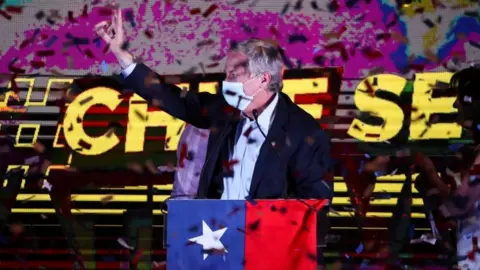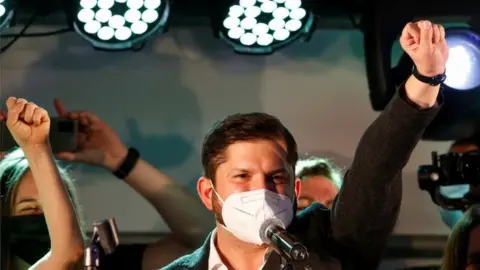Far-right candidate through to Chile presidential run-off
 Reuters
ReutersIn Chile, the election for a new president will go into a second round on 19 December after none of the seven candidates managed to secure the necessary 50% needed to win outright.
Far-right candidate José Antonio Kast will face left-wing former student leader Gabriel Boric in the run-off.
The election is one of the most polarised in recent decades and comes after mass anti-government protests.
Mr Kast described it as a choice between "liberty and communism".
Mr Boric, meanwhile, said he was fighting "for democracy, for inclusion, for justice".
With 97% of the votes counted, Mr Kast was in the lead with 27.94%, followed by Mr Boric with 25.75%.
Economist Franco Parisi, who lives in the United States and did not travel to Chile to campaign, won a surprise third place but only the candidates placed first and second will dispute the second round.
Mr Kast and Mr Boric will now try to woo those who voted for Mr Parisi and the other unsuccessful presidential candidates.
The two men differ greatly both in their backgrounds and their plans for Chile's future.
 Reuters
ReutersIf successful, Mr Boric would become the youngest president of Chile in centuries at 35 years of age.
His youth and moderate left-wing stance have proven attractive to Chileans favouring progressive ideas.
Speaking after he progressed into the second round he said: "We have been entrusted to lead a dispute for democracy, for inclusion, for justice, for the respect and dignity of all."
Mr Kast, 55, referred to some of the law and order challenges facing the new president, such as the tense situation in the south, where indigenous Mapuche activists have been waging a long battle for ancestral rights.
"Let no one get it wrong, the only presidential candidacy that will restore peace, the only presidential candidacy that is an alternative to face criminals and drug traffickers and the only option that will put an end to terrorism, is the one we represent, there is no other," Mr Kast said.
The two candidates also have widely divergent approaches to the economy with Mr Kast promising a return to the low tax policies of the Pinochet military rule, about which he has spoken sympathetically.
Mr Boric on the other hand proposes investing in the education system and strengthening environmental protections.
With more people expected to turn out to vote in the second round than the first, the fight to sway those undecided will be fierce.
